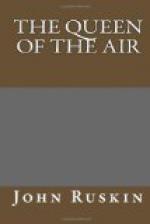* On the altar of Hermes on its summit, as on that of the Lacinian Hera, no wind ever stirred the ashes. By those altars, the Gods of Heaven were appeased, and all their storms at rest.
27. Now, it will be wholly impossible, at present, to trace for you any of the minor Greek expressions of this thought, except only that Mercury, as the cloud shepherd, is especially called Eriophoros, the wool-bearer. You will recollect the name from the common woolly rush “eriophorum” which has a cloud of silky seed; and note also that he wears distinctively the flap cap, petasos, named from a word meaning “to expand;” which shaded from the sun, and is worn on journeys. You have the epithet of mountains “cloud-capped” as an established form with every poet, and the Mont Pilate of Lucerne is named from a Latin word signifying specially a woollen cap; but Mercury has, besides, a general Homeric epithet, curiously and intensely concentrated in meaning, “the profitable or serviceable by wool,"* that is to say, by shepherd wealth; hence, “pecuniarily,” rich or serviceable, and so he passes at last into a general mercantile deity; while yet the cloud sense of the wool is retained by Homer always, so that he gives him this epithet when it would otherwise have been quite meaningless (in Iliad, xxiv. 440), when he drives Priam’s chariot, and breathes force into his horses, precisely as we shall find Athena drive Diomed; and yet the serviceable and profitable sense—and something also of gentle and soothing character in the mere wool-softness, as used for dress, and religious rites—is retained also in the epithet, and thus the gentle and serviceable Hermes is opposed to the deceitful one.
* I am convinced that the ‘eri’ in ‘eriounios’ is not intensitive, but retained from ‘erion’; but even if I am wrong in thinking this, the mistake is of no consequence with respect to the general force of the term as meaning the profitableness of Hermes. Athena’s epithet of ‘ageleia’ has a parallel significance. [Transcriber’s note: words inside single apostrophes are Greek, and use the Greek alphabet.]
28. In connection with this driving of Priam’s chariot, remember that as Autolycus is the son of Hermes the Deceiver, Myrtilus (the Auriga of the Stars) is the son of Hermes the Guide. The name Hermes itself means impulse; and he is especially the shepherd of the flocks of the sky, in driving, or guiding, or stealing them; and yet his great name, Argeiphontes, not only—as in different passages of the olden poets—means “Shining White,” which is said of him as being himself the silver cloud lighted by the sun; but “Argus-killer,” the killer of rightness, which is said of him as he veils the sky, and especially the stars, which are the eyes of Argus; or, literally, eyes of brightness, which Juno, who is, with Jupiter, part of the type of highest heaven, keeps in her peacock’s train. We know that this interpretation is right, from a passage in which Euripides describes the shield of Hippomedon, which bore for his sign, “Argus the all-seeing, covered with eyes; open towards the rising of the stars and closed towards their setting.”




